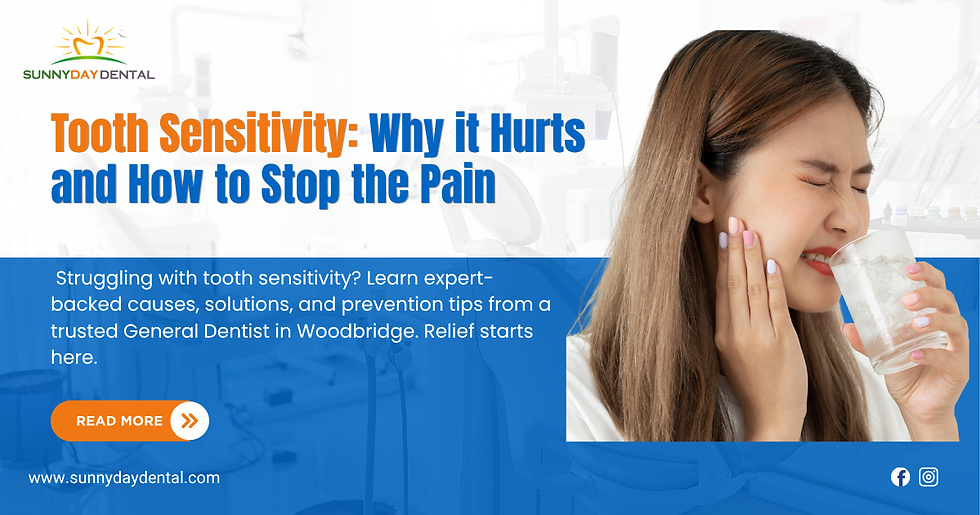What Is TMJ Disorder? Symptoms, Causes & When to See a Dentist
- Sunny Day Dental
- Jul 21
- 3 min read

If you've ever felt a sharp or dull ache around your jaw, heard clicking sounds when you chew, or struggled to open your mouth fully, you might be dealing with TMJ disorder. Short for temporomandibular joint disorder, TMJ issues affect the joints that connect your jawbone to your skull. These joints are small, but they play a big role in eating, speaking, and even smiling.
This guide will walk you through everything you need to know about TMJ disorder, including symptoms, causes, how to find TMJ pain relief, and when it’s time to visit a dentist in Woodbridge.
What Are the Symptoms of TMJ Disorder?
TMJ disorder can present in different ways, depending on the severity and cause. Common signs include:
Jaw pain or tenderness, especially near the ears
Clicking, popping, or grinding sounds when opening or closing your mouth
Difficulty or discomfort when chewing
Locking of the jaw joint
Headaches or pain that radiates to the neck or shoulders
Uneven bite or jaw misalignment
If you're experiencing jaw pain when chewing, especially accompanied by any of these symptoms, it's time to consider an evaluation.
What Causes TMJ Disorder?
There isn't a single cause for TMJ disorder, but several contributing factors include:
Teeth grinding or jaw clenching (often due to stress or anxiety)
Jaw injury from trauma or overuse
Arthritis, including osteoarthritis or rheumatoid arthritis
Malocclusion (improper alignment of teeth)
Disc displacement within the joint
People who constantly chew gum or have poor posture (especially those working long hours at desks) may also experience strain on the TMJ.
TMJ Pain Relief: What Really Works?
Relieving TMJ disorder starts with understanding its root cause. Here are some proven strategies for TMJ pain relief:
Cold or warm compresses – Alternate heat and cold to reduce inflammation
Over-the-counter pain relievers – Ibuprofen or acetaminophen can offer short-term relief
Jaw exercises and stretches – Gentle movement therapy helps improve joint function
Nightguards or bite splints – Customized dental devices can prevent clenching
Lifestyle adjustments – Limiting chewy foods, managing stress, and correcting posture can make a big difference
For ongoing or worsening pain, a dentist for jaw pain near me can provide advanced solutions like dental splints, orthodontics, or even referrals to oral surgeons if necessary.
When Should You See a Dentist in Woodbridge?
Not all jaw pain needs emergency care, but some signs mean it’s time to act:
Persistent jaw pain lasting more than a week
Pain that worsens with chewing or yawning
Locking jaw or inability to open your mouth fully
Headaches or ear pain that feel related to jaw movement
Worn-down teeth due to grinding
A dentist in Woodbridge can perform a thorough examination, possibly using imaging to evaluate your joint health and develop a treatment plan tailored to your needs.
Why Ignoring TMJ Disorder Can Make It Worse
Many people delay seeking help, thinking the pain will go away. But untreated TMJ disorder can lead to:
Chronic pain and inflammation
Irreversible joint damage
Poor sleep due to discomfort
Difficulty eating or speaking
Early diagnosis makes all the difference. Whether you're experiencing jaw pain when chewing or chronic clicking sounds, it’s best not to ignore the warning signs.
What Is TMJ Disorder?
TMJ disorder refers to a condition affecting the temporomandibular joints, which connect your jaw to your skull. It can cause jaw pain, difficulty chewing, and clicking or locking of the jaw. Causes range from stress-related clenching to arthritis or jaw injury.
Book a Consultation at Sunny Day Dental
If you’re struggling with TMJ disorder and searching for trusted care, Sunny Day Dental in Woodbridge offers personalized evaluations and treatments to restore jaw health. Our team uses advanced diagnostic tools, custom appliances, and patient education to provide lasting TMJ pain relief. Whether you’re facing mild discomfort or severe joint problems, our goal is to help you feel better fast.
Frequently Asked Questions
1. Can TMJ disorder go away on its own?
In mild cases, yes. TMJ symptoms can resolve with rest, stress reduction, and proper jaw care. However, persistent or worsening symptoms should be addressed by a dental professional.
2. Are there any foods I should avoid with TMJ disorder?
Yes. Avoid hard, crunchy, or chewy foods like nuts, gum, and tough meats. Stick to soft foods like mashed potatoes, yogurt, scrambled eggs, and smoothies to reduce joint strain.
3. Is TMJ disorder permanent?
Not always. With the right treatment—ranging from self-care to professional dental solutions—many patients recover completely or manage the condition effectively.
4. What happens if TMJ disorder is left untreated?
Untreated TMJ issues can lead to chronic pain, jaw locking, bite problems, and even damage to the joint cartilage or bone. Early intervention prevents long-term complications.
5. How is TMJ disorder diagnosed?
A dentist will perform a physical exam, check jaw movement and alignment, and may use X-rays or 3D imaging to confirm joint abnormalities. A complete history of symptoms helps tailor treatment.




Comments